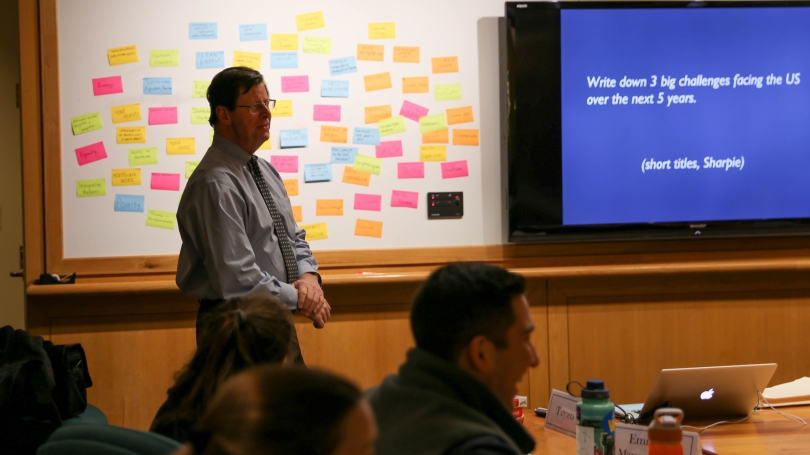
Menu
- Public Policy
- Leadership
- Funding
- News & Events
- About the Center
Back to Top Nav
Back to Top Nav
Back to Top Nav
Back to Top Nav
Professor Peter Robbie, an Associate Professor at Thayer, industrial designer, and design consultant, has been teaching design thinking at Dartmouth for almost 30 years. He encourages students to tackle complex problems in the world using an empathetic, human-centered approach. He believes that to solve these problems, we need interdisciplinary leaders who are innovative thinkers.
He led the Fellows in a session entitled, “Leading Creative Collaboration.” He began by defining “innovation,” which has now become a buzz word in the creative world, as the intentional implementation of the novel and useful.
We live in a time when creative collaborations are incredible important for three main reasons. Professor Robbie highlighted the rise of the creative economy as an increasingly integral component for individuals and organizations. He told us that we live under the illusion of normalcy and wellbeing in society, before revealing that we are living in times of revolution. The leaders of such a revolution should understand what the world needs based on observation and empathetic design research. Lastly, he mentioned that problems cannot be solved by the same level of thinking that created them.
A case study to exemplify this behavior came in the form of a redesigned MCAT machine for children. One of the inventors of the machine watched as young children cried at the sight of what he had created. He realized that he needed to reframe the experience as something that the children wanted to do, so he organized an effort to turn the MCAT machines into pirate ships and camping tents—reframing small spaces as adventure rather than something to be feared.
We all have this power within us to change the world in informed ways, we just need to avoid some common traps that Professor Robbie highlighted. Dump your idols and ditch your assumptions, he told us, because we tend to prefer the familiar and trust the new. Be on the lookout for biases and don’t fall in love with your first idea, he added.
We had a chance to put these methodologies into practice as we brainstormed wicked problems of the world that needed to be solved. We practiced PO statements, mind mapped, and discussed ways to improve Dartmouth’s campus environment.
Professor Robbie ended the session by inspiring us to speculate about what could be and the necessity of developing a tolerance for ambiguity. Believe in the power of envisioning, he declared as we left the session with our heads full of ideas and so many colored Post-Its scattered on the tables and walls.
-Written by Jessica Colin, Class of 2018, Rockefeller Leadership Fellow
As Rockefeller Leadership Fellows, seniors gain a better understanding of the qualities and responsibilities expected of leaders. As Fellows take part in the workshops, dinner discussions, and team-building exercises, they examine their skills, qualities, and attributes as leaders and analyze how these influence teamwork and achieving goals.